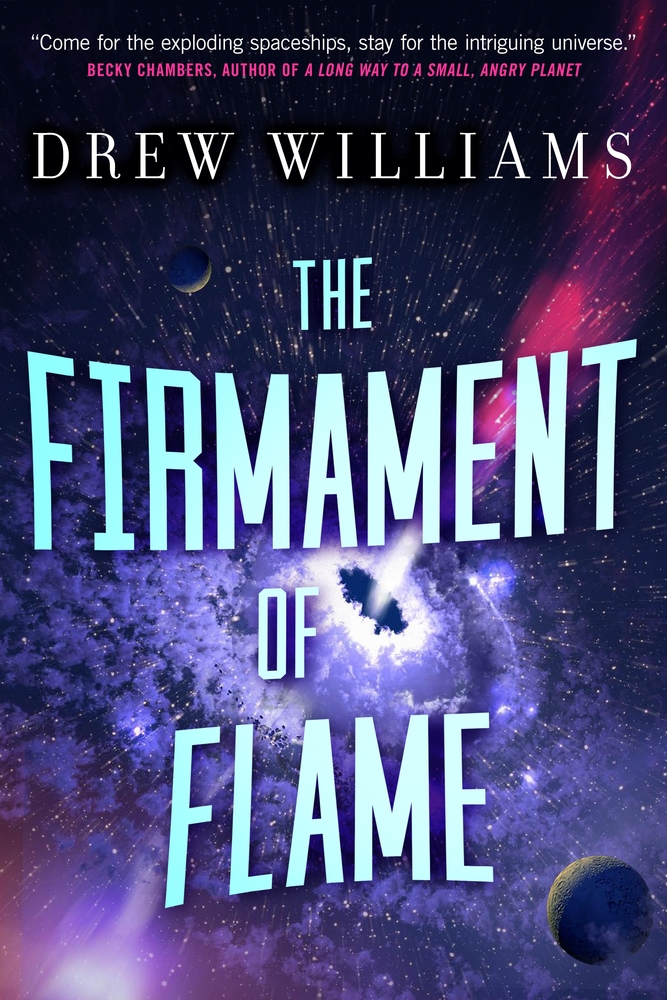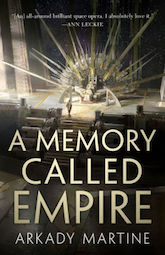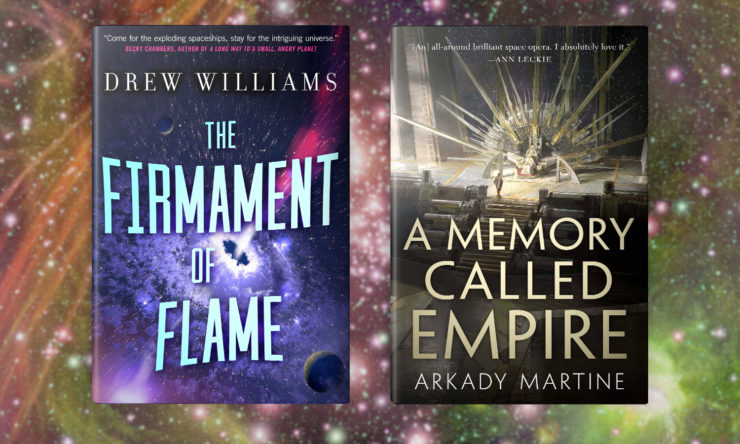We recently sat down Drew Williams, author of the Universe After series, and Arkady Martine, author of the Teixcalaan series, to chat about all things space opera!
In the following conversation, the two skilled sci-fi writers discuss the craft of writing stories that take place in a far-future we can’t see, how the genre handles the concept of empire, and the whether or not their stories could take place in say, a modern office setting instead.
What made you decide to set your books in space, in a time distant from our own?
Drew Williams: I think one of the best things about science fiction is—going all the way back to Frankenstein—it lets you ask questions about our world, about the way we interact with each other, using metaphors that just don’t exist in reality. Plus, you have such total control over, well… literally everything: technology, history, culture. If you need something to be true, you can just make it true, and then watch as that chaos spills over into the narrative you’re actually writing.
Arkady Martine: What Drew said is very accurate—I picked a far-future spacefaring society so that I could play with some big questions about empire, assimilation, identity, memory, all isolated from their current, present-time contexts. Science fiction—far-future SF in particular—is a way of getting close to a complicated issue, close enough to resonate, close enough to hurt, but (and I think I’ve said this elsewhere) not close enough to cut yourself or your reader open on. There’s a remove that lets you get deeper in, in a philosophical sense. I think ultimately I still hold on to the base concept of science fiction as thought experiment: what if this were true, what would that mean for us? And I find far-future easier to work with. Near-future is a very fast-moving target, and I’m no William Gibson.
DW: Yeah, my terror when it comes to near future, I think, is that I barely understand how technology is evolving right now—I can chart a course way, way, way out in the future, but a question like ‘what will social media become in the next ten years’ is actually far more intimidating to me than ‘what will our society’s embrace of social media turn us into in a hundred years’.
AM: Exactly this! I am not a futurist—mostly. Not on technology, anyway. Maybe on energy grids or climate change, because of the day job work I do, but ten-years-from-now is too close in the flux of change to see clearly. For me, anyhow.
Buy the Book


The Firmament of Flame
What do you think makes a story “space opera”? Do you like using that term for your own books, or is there another one you like to use?
DW: Honestly, I love the term, I’m happy to embrace it; I love the notion of telling big, operatic, even melodramatic stories. To me, stories are supposed to elicit emotion, that’s why we engage with them, so I find the ‘opera’ portion to be almost more fun than the ‘space’ part!
AM: I like the ‘opera’ part too—it suggests a grandeur of scale that I thoroughly enjoy writing (and reading). I grew up on opera, oddly enough: my father’s a musician and he played viola in the Metropolitan Opera Orchestra in New York City until he retired. Intense, high-stakes, emotion-and-politics-focused stories are in my blood. It is a little weird for me to think of the Teixcalaan books as space opera, though. Not that I have a better term for them—in the current genre landscape they most certainly are more space opera than anything else—but I’ve always thought of them as political thrillers in space. But hey, they’re not military SF, and the term ‘planetary romance’ is even more misleading, and if Dune is space opera then so am I, basically.
DW: Space thrillers! No, that sounds like Alien. Ummmm…. (significantly too much time passes as I try to sort out an answer). Yeah, I got nothing.
What kinds of questions did you ask yourself when you were building your world?
AM: I worldbuild backwards, I suspect. I start with the situation I want and then figure out how to make it plausible and what rules I need to set for myself. For instance, the Teixcalaan books have FTL travel through ‘jumpgates’—basically wormholes, little connections between two places in spacetime. Two-way travel, but noncontiguous and only from point A to point B and back again. I built the travel that way because I wanted to set up a situation that looked just like the problems of a late-medieval empire with a bunch of mountain passes at its borders: you can’t shove a whole army through that. Not very fast. And I needed that set-up for the story I wanted to tell, so I had to find some (faintly plausible) physics to make that story work…
DW: I do much the same; I start with ‘how do I want these societies to work’, and then come up with technologies or histories that can kind of reinforce where I want the narrative to be. I don’t so much worry about the plausibility, though; so long as it’s consistent—so long as I know, for example, roughly how long it takes to cross from one solar system to a nearby solar system in hyperspace, and that remains true across the novels—I don’t really try to wring my brain out with the physics. Mainly because I’m incredibly bad at physics.
How do you think space opera stories can approach the concept of empires in a different way than other genres?
AM: Well, there’s a long, long history of empire in space opera. Not all of that is a good thing. It’s so often unexamined—background radiation. You have a space opera, you have a giant space empire, usually evil. Or if it’s not evil, it’s actually a space federation, and might as well be American democracy on a grand scale (i.e., still an empire, just a hidden one that likes to pretend otherwise). But that long history gives us a lot of material to work with. A lot of assumptions to play with. I personally am interested in why empire is so damn seductive, despite how horrible it is, and space opera is an easy way to crack open that particular rotten fruit.
DW: I do think authoritarianism is kind of the ‘fallback’ position of pretty much every human society, something we have to constantly be working against in order to escape, like a kind of social inertia. (Not that all empires are inherently authoritarian, but given that’s how they’re most often used, I’m tailoring my answer around that.) I also think when you’re dealing with space opera specifically—different planets, different cultures, removed from each other across the vastness of space—a certain ambition is required to drive conflict, which is typically a requirement of a narrative, and imperial ambitions tend to fit nicely into that space.
AM: It’s interesting that you bring up ambition in the context of distance. I absolutely see that emphasis in space opera—something about cosmopolitanism and long travel times reminds us—or me, at least—of historical stories about empires and empire-builders. I think ‘imperial ambitions’ are not the only way an empire can be explored in space opera, though, or even the most common way it is explored. I personally am interested in the giant sociological forces that you also get in the context of cosmopolitanism and long travel times. And in cultural diffusion. But then, this is me being obsessed with theme, perhaps to the detriment of character work…
Buy the Book


A Memory Called Empire
What are some books (or movies or games) that inspired this series, directly or indirectly?
AM: CJ Cherryh’s Foreigner series is a pretty direct inspiration for the Teixcalaan books—I definitely wanted to write, in some ways, a response to Foreigner. But most of the inspiration for A Memory Called Empire comes straight out of Byzantine and Armenian history.
DW: I mean, Star Wars, for sure, and Joss Whedon’s Firefly; also, just in general, any time I’m writing space-based sci-fi, I try to keep Douglas Adams’s The Hitchhiker’s Guide in the back of my mind, just because of how well Adams gets across the notion of the vastness of space, of just how big a galaxy with multiple space-faring races would be.
You both have multiple books in your series (Drew is on his third book, Arkady is working on the second). What was harder (or easier) about continuing the story in the world you started?
DW: For me, honestly, it gets easier with each one; in the first book, you’ve got to create… pretty much everything—technology, cultures, social structures, histories, character relationships. Moving forward, most of that scaffolding—the stuff you hang the story on, even if that’s not what the story is about—is already in place, so it’s a little easier just to hit the ground running.
AM: Everything is harder with book two. Yes, I’ve created all that scaffolding—but now I have to remember it, and not contradict myself, and do proper housekeeping tasks like keeping a list of names and remembering what I called the different classes of warships and have I mentioned I don’t outline, usually? So the crosschecking is a bit arduous.
DW: Oh, I never outline either, but I think that’s honestly why I prefer working on the sequels—because as much as I avoid actively outlining, I was probably thinking about what might happen next when I was writing the first book. So there’s at least a germ of a narrative for me to start with (as opposed to with the first book, where I usually start with the setting and the characters, and then fumble my way toward the narrative as I go).
If you were to pick an entirely new genre or setting for your books what would you do? (For instance, would you turn them into epic fantasy? Set them in a contemporary office?)
DW: I don’t know that I could set this story in a different setting… but I would love to see a different type of story in the same setting. Like, a wacky workplace sitcom that just follows my characters around the galaxy when they’re not busy trying to stop everything from exploding, complete with comic misunderstandings and guest appearances from recurring tertiary characters I never got to spend as much time with as I wanted to.
AM: … … A Memory Called Empire as a modern corporate office drama with thriller aspects works surprisingly well. I wouldn’t have to change much except the tech level, if I used a big enough multinational corporation + a small independent company as the basic set-up. This is a fascinating and terrifying realization. Good lord.
Would you or would you not like to live in the galaxy you’ve created for your series? Who would you be?
DW: God, no. I would… I would die. Even if I somehow had the knowledge of how to operate in that universe, and wasn’t, like, the science-fiction equivalent of Brendan Fraser in Encino Man (it’s a movie about a Neanderthal that gets unthawed in the… never mind), I would still almost certainly get murdered. Very, very quickly.
AM: I will shamefully admit I built the Teixcalaanli Empire to be absolutely everything that would eat me alive and make me enjoy the process. Yes, in short. Yes, I would like to live there. It would, of course, be easier to be a Teixcalaanlitzlim. Much, much, much easier. Which is the point of Teixcalaan, entirely.
DW: My turn to ask a question! What’s the weirdest thing you’ve ever researched? Doesn’t have to be something with a direct connection to a novel; I once spent like three hours researching cliff diving, because I thought maybe it had some sort of connection to the scene I was writing… and also, after a while, I was just having fun watching the videos.
AM: …ever? Okay. Um. Fungal symbiosis in wasps. It’s surprisingly relevant for A Desolation Called Peace. Also it’s gross, in the way that I can’t look away from.
DW: Ha! That’s awesome. And I am in no way shape or form going to look it up. (Looks it up.) God… god damn you.
Drew Williams’ Universe After series publishes with Tor Books.
Book three, The Firmament of Flame, is available now.
Arkady Martine’s A Memory Called Empire is available from Tor Books.
Book two in the Teixcalaan series, A Desolation Called Peace, publishes in March 2021.










